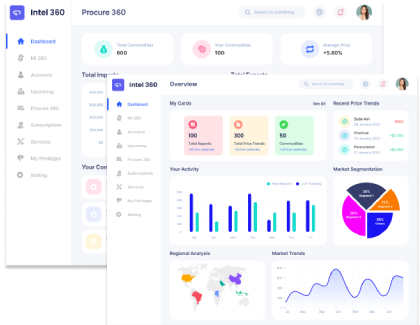Navigating Sustainable, Profitable Growth in a Rapidly Changing World

The global knee cartilage repair market is expected to be driven by high incidence of knee injury and the demand for effective treatment solutions. Further, advancements in treatment systems enabling modern and effective solutions are expected to boost the market. North America, Europe and Asia Pacific are projected to be major markets.
The tissue that covers the adjoining bone surfaces of the knee and forms a smooth surface for mobility is known as articular or hyaline cartilage. Because of direct injury to the knee, articular cartilage may get damaged, resulting in swelling, stiffness, locking, and limited movement. Articular cartilage has limited capacity for self-repair. The word "osteoarthritis (OA)" refers to the generalised wearing out of cartilage, however, all cartilage injury is a part of the osteoarthritis process. Cartilage acts as a cushion between the bones of joints; it holds bones together, reduces friction and supports the weight of the body during running, bending and stretching.
Cartilage is of three types. The most spongy and flexible type of cartilage is elastic cartilage (yellow cartilage). The outside of the ears and a portion of the nose are made of elastic cartilage. Fibrocartilage is the hardest cartilage kind, capable of withstanding enormous loads. It's present between the spine's discs and vertebrae, as well as the hip and pelvis' bones. Hyaline cartilage (articular cartilage), found between the ribs, around the windpipe, and between the joints, is spongy, robust, and flexible.
Unlike other types of tissue, cartilage does not have a blood supply, thus, damaged cartilage takes much longer to heal, compared with other tissues that are supplied by blood. Joint discomfort, stiffness, and inflammation may indicate cartilage degradation. Because cartilage does not effectively self-heal, surgical procedures to encourage the creation of new cartilage have been devised. Articular cartilage restoration can help reduce discomfort and improve function. It can also delay or prevent the beginning of arthritis.
Read more about this report - REQUEST FREE SAMPLE COPY IN PDF
Treatments to repair knee cartilage include:
Arthroscopic Debridement – Employed when damage to the cartilage is relatively less. It includes cleaning up of loose tissue.
Microfracture – A surgical procedure carried out to treat damaged cartilage areas. It entails stimulating new cartilage growth in patients with small areas of damaged cartilage by piercing the subchondral bone.
Autologous chondrocyte implantation (ACI) – Usually performed on younger patients. The two-step process is carried out over several weeks to complete. The first step entails extraction of healthy cartilage cells from a non-weight bearing area of the knee, which is cloned and developed in the laboratory for 6 – 8 weeks. The newly grown cells are then implanted into the deficient area through a surgical procedure.
Articular cartilage repair: Matrix-induced autologous chondrocyte implantation (MACI) – An advancement of the ACI approach. Healthy cartilage cells are extracted from the patient, then expanded and seeded in a collagen matrix; these are then re-implanted into the cartilage defect.
Osteochondral Autograft Transplantation (Mosaicplasty) – A single step procedure, that entails harvesting of a piece of healthy tissue and bone from an unaffected, non-weight bearing site, and planting it to replace the damaged area. When several such pieces or ‘plugs’ are used, the outcome resembles a mosaic pattern. This is why the term mosaicplasty is used.
Major firms such as Stryker Corporation, Smith and Nephew, Vericel Corporation provide treatment solutions for joint problems. In 2017, Vericel Corporation announced the first MACI implant in USA to repair symptomatic single or multiple full-thickness cartilage defects of the knee with or without bone involvement in adults. Smith and Nehphew offer CARGEL Bioscaffold - an easy, ready-to-use product employed in a single-step bone marrow stimulation procedure to provide superior cartilage repair. ProChondrix CR by Stryker is a cryopreserved, fresh osteochondral allograft with live cells and other biological elements. The solution has been designed to repair damaged cartilage tissue, and can be employed in several orthopedic reconstructive processes to assist in the repair of articular cartilage.
Market Analysis by Modality, Treatment Type, End-user, and Region:
- By modality, the market is segmented into Cell-Based (further broken down by type into Chondrocyte Transplantation and Growth Factor Technology), and Non-Cell Based (further broken down by type into Tissue Scaffolds and Cell-Free Composites).
- By treatment type, the market is classified into Palliative (further broken down by type into Viscosupplementation and Debridement and Lavage) and Intrinsic Repair Stimulus.
- By end-user, the market is divided into Hospitals, Ambulatory Surgical Centers, Orthopaedic Clinics, and Others.
- By region, the market is segmented into North America, Europe, Asia Pacific, Latin America, and Middle East and Africa.
Top Players:
- Stryker
- Zimmer Biomet
- B. Braun Melsungen AG
- The Future of Biotechnology
- MEDIPOST
- Vericel Corporation
- CONMED Corporation
- Meril Life Sciences Pvt. Ltd.
- Medacta International
- Teijin Nakashima Medical Co., Ltd.
- EVOLUTIS INDIA PVT. LTD.
- Regentis Biomaterials Ltd.
- Auxein Medical.
About Us
Expert Market Research (EMR) is a leading market research and business intelligence company, ensuring its clients remain at the vanguard of their industries by providing them with exhaustive and actionable market data through its syndicated and custom market reports, covering over 15 major industry domains. The company's expansive and ever-growing database of reports, which are constantly updated, includes reports from industry verticals like chemicals and materials, food and beverages, energy and mining, technology and media, consumer goods, pharmaceuticals, agriculture, and packaging.
EMR leverages its state-of-the-art technological and analytical tools, along with the expertise of its highly skilled team of over 100 analysts and more than 3000 consultants, to help its clients, ranging from Fortune 1000 companies to small and medium-sized enterprises, easily grasp the expansive industry data and help them in formulating market and business strategies, which ensure that they remain ahead of the curve.
Contact Us
Expert Market Research
Website: www.expertmarketresearch.com
Email: [email protected]
US & Canada Phone no: +1-415-325-5166
UK Phone no: +44-702-402-5790
Report Summary
| REPORT FEATURES | DETAILS |
| Base Year | 2025 |
| Historical Period | 2019-2025 |
| Forecast Period | 2026-2035 |
| Scope of the Report |
Historical and Forecast Trends, Industry Drivers and Constraints, Historical and Forecast Market Analysis by Segment:
|
| Breakup by Treatment Modality |
|
| Breakup by Surgery |
|
| Breakup by Devices |
|
| Breakup by Application |
|
| Breakup by End User |
|
| Breakup by Region |
|
| Market Dynamics |
|
| Competitive Landscape |
|
| Companies Covered |
|
| Report Price and Purchase Option | Explore our purchase options that are best suited to your resources and industry needs. |
| Delivery Format | Delivered as an attached PDF and Excel through email, with an option of receiving an editable PPT, according to the purchase option. |
How To Order
Our step-by-step guide will help you select, purchase, and access your reports swiftly, ensuring you get the information that drives your decisions, right when you need it.

Select License Type
Choose the right license for your needs and access rights.

Click on ‘Buy Now’
Add the report to your cart with one click and proceed to register.

Select Mode of Payment
Choose a payment option for a secure checkout. You will be redirected accordingly.
Single User License
USD 5,499
USD 4,949
tax inclusive*
- All Segments
- Printing Restrictions
- PDF Delivered via Email
- Custom Report Layout
- Post Sales Analysts Support
- Periodic Updates
- Unlimited Prints
Datasheet
USD 3,299
USD 2,969
tax inclusive*
- Selected Segments
- Printing Restrictions
- Excel Spreadsheet Delivered via Email
- Full Report
- Periodic Updates
- Post Sales Analysts Support
- Unlimited Prints
Five User License
USD 6,999
USD 5,949
tax inclusive*
- All Segments
- Five Prints Available
- PDF Delivered via Email
- Limited Free Customization
- Post Sales Analyst Support
- Custom Report Layout
- Periodic Updates
- Unlimited Prints
Corporate License
USD 8,199
USD 6,969
tax inclusive*
- All Segments
- Unlimited Prints Available
- PDF & Excel Delivery via Email
- Limited Free Customization
- Post Sales Analysts Support
- Discount On Next Update
- Custom Report Layout
*Please note that the prices mentioned below are starting prices for each bundle type. Kindly contact our team for further details.*
Flash Bundle
Small Business Bundle
Growth Bundle
Enterprise Bundle
- Life Time Access
- Analyst Support Related to Report
- PDF Version of the Report
- Complimentary Excel Data Set
- Free Analyst Hours
- Complimentary Free 1 Month Subscription to Trade Data Base
- Complimentary One Month Subscription to Price Database (Chemicals only)
- Complimentary PPT Version of the Report
- Complimentary License Upgrade
- Complimentary Power BI Dashboards
- Life Time Access
- Analyst Support Related to Report
- PDF Version of the Report
- Complimentary Excel Data Set
- Free Analyst Hours - 50 Hours
- Complimentary Free 1 Month Subscription to Trade Data Base
- Complimentary One Month Subscription to Price Database (Chemicals only)
- Complimentary PPT Version of the Report
- Complimentary License Upgrade
- Complimentary Power BI Dashboards
- Life Time Access
- Analyst Support Related to Report
- PDF Version of the Report
- Complimentary Excel Data Set
- Free Analyst Hours - 80 Hours
- Complimentary Free 1 Month Subscription to Trade Data Base
- Complimentary One Month Subscription to Price Database (Chemicals only)
- Complimentary PPT Version of the Report
- Complimentary License Upgrade
- Complimentary Power BI Dashboards
- Life Time Access
- Analyst Support Related to Report
- PDF Version of the Report
- Complimentary Excel Data Set
- Free Analyst Hours - 100 Hours
- Complimentary Free 1 Month Subscription to Trade Data Base
- Complimentary One Month Subscription to Price Database (Chemicals only)
- Complimentary PPT Version of the Report
- Complimentary License Upgrade
- Complimentary Power BI Dashboards
*Please note that the prices mentioned below are starting prices for each bundle type. Kindly contact our team for further details.*
Flash Bundle
Number of Reports: 3
20%
tax inclusive*
- 3 Reports Included
- Life Time Acess
- Analyst Support Related to Report
- PDF Version of the Report
- Free 1 Month Subscription to Trade Data Base
- 1 Month Subscription to Price Database (Chemicals only)
- Complimentary Excel Data Set
- PPT Version of the Report
- Power BI Dashboards
- License Upgrade
- Free Analyst Hours
Small Business Bundle
Number of Reports: 5
25%
tax inclusive*
- 5 Reports Included
- Life Time Acess
- Analyst Support Related to Report
- PDF Version of the Report
- Complimentary Excel Data Set
- Free Analyst Hours - 50 Hours
- Free 1 Month Subscription to Trade Data Base
- 1 Month Subscription to Price Database (Chemicals only)
- Complimentary Excel Data Set
- PPT Version of the Report
- Power BI Dashboards
- License Upgrade
Growth Bundle
Number of Reports: 8
30%
tax inclusive*
- 8 Reports Included
- Life Time Acess
- Analyst Support Related to Report
- PDF Version of the Report
- Complimentary Excel Data Set
- Free Analyst Hours - 50 Hours
- Free 1 Month Subscription to Trade Data Base
- 1 Month Subscription to Price Database (Chemicals only)
- License Upgrade
- Free Analyst Hours - 80 Hours
- Power BI Dashboards
Enterprise Bundle
Number of Reports: 10
35%
tax inclusive*
- 10 Reports Included
- Life Time Acess
- Analyst Support Related to Report
- PDF Version of the Report
- Complimentary Excel Data Set
- Free Analyst Hours - 50 Hours
- Free 1 Month Subscription to Trade Data Base
- 1 Month Subscription to Price Database (Chemicals only)
- License Upgrade
- Power BI Dashboards
- Free Analyst Hours - 100 Hours








